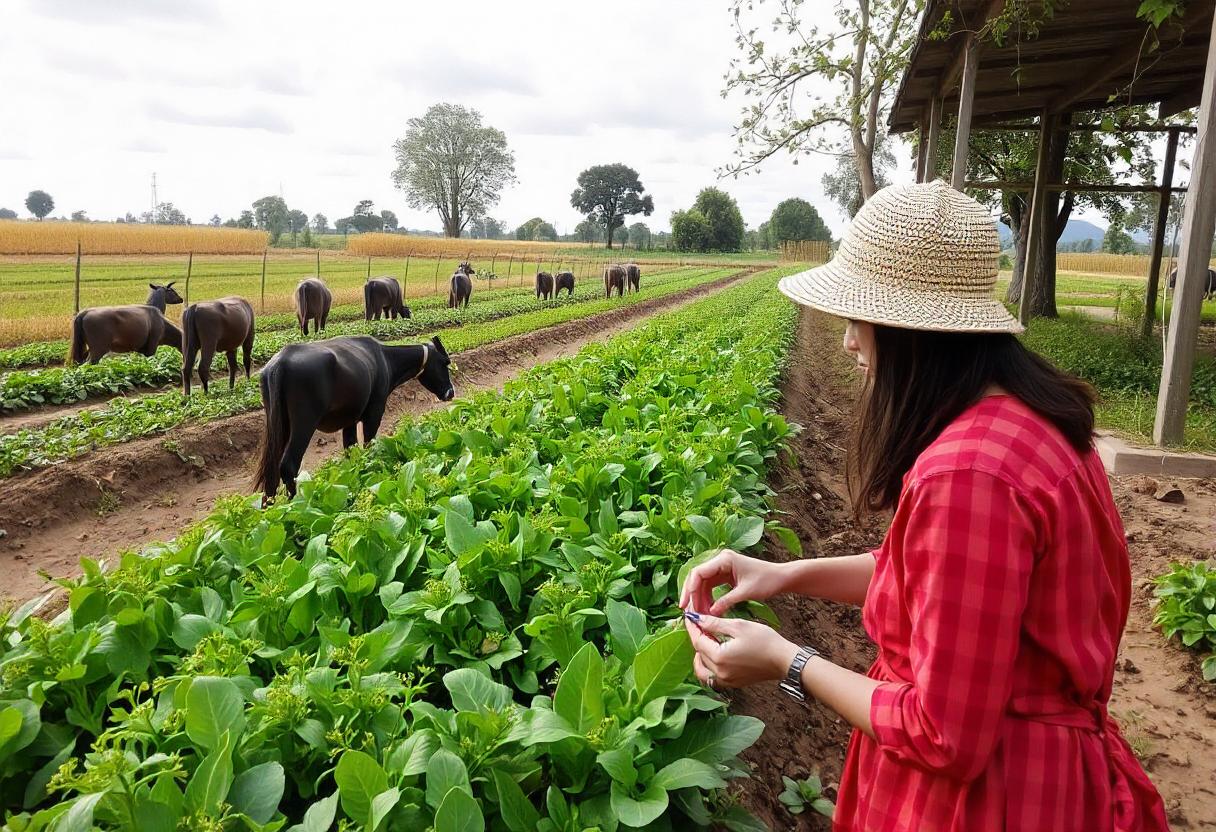
Ecological farming refers to agricultural practices that seek to maintain the balance between farming and the environment. Unlike conventional methods, which rely heavily on synthetic chemicals and monoculture, ecological farming promotes sustainable methods that protect biodiversity, improve soil health, and support ecosystems. This approach integrates natural processes into agricultural production, ensuring the long-term health of the land.
Soil Conservation and Improvement
One of the core principles of ecological farming is the preservation and enhancement of soil health. Farmers practicing ecological agriculture focus on increasing organic matter in the soil, reducing erosion, and maintaining the balance of soil nutrients. Techniques like crop rotation, cover cropping, and reduced tillage are widely used to achieve these goals. These practices not only prevent soil degradation but also improve its fertility, which leads to higher yields in the long run.
Composting is another essential practice that involves recycling organic waste materials into nutrient-rich soil amendments. By applying compost to the fields, farmers can enhance the biological activity of the soil, making it more resilient to droughts and other extreme weather conditions.
Water Conservation Techniques
Water management is critical in ecological farming. Efficient use of water resources not only ensures crop growth but also prevents the depletion of local water sources. Ecological farmers employ techniques like rainwater harvesting, drip irrigation, and mulching to conserve water.
Rainwater harvesting allows farmers to collect and store rainwater for future use, reducing dependence on groundwater or surface water sources. Drip irrigation systems ensure that water is delivered directly to the plant’s roots, minimizing evaporation and water waste. Mulching, the practice of covering the soil with organic or synthetic materials, helps retain soil moisture and suppress weed growth.
Integrated Pest Management (IPM)
Instead of relying on synthetic pesticides, ecological farming emphasizes integrated pest management (IPM) to control pests and diseases. IPM is a holistic approach that combines various biological, physical, and cultural methods to keep pest populations under control.
Some of the strategies include using beneficial insects, such as ladybugs and parasitic wasps, to prey on harmful pests. Crop rotation and intercropping also play a crucial role in disrupting pest lifecycles, preventing them from establishing large populations. Additionally, organic pesticides derived from natural sources, such as neem oil, are used as a last resort when other methods fail to keep pests in check.
Biodiversity Promotion
Ecological farming promotes biodiversity by encouraging the cultivation of a wide variety of crops and integrating livestock into farming systems. This diversity helps create a balanced ecosystem where pests and diseases are less likely to cause significant damage.
Polyculture, the practice of growing multiple crops in the same space, is a common technique that improves soil fertility and reduces the risk of pest infestations. Moreover, integrating livestock into farming systems can further enhance the sustainability of the farm, as animals provide manure that enriches the soil, and grazing livestock can help manage weeds naturally.
Agroforestry and Perennial Crops
Agroforestry, which combines trees and shrubs with crops and livestock, is another ecological farming practice that improves soil health, conserves water, and increases biodiversity. The presence of trees helps reduce soil erosion, provides shade for crops, and increases carbon sequestration.
Perennial crops, such as fruit trees and nut-bearing plants, play a key role in ecological farming. Unlike annual crops, which need to be replanted each year, perennial crops have longer lifespans and require less frequent soil disturbance. This reduces the impact on soil structure and minimizes the need for chemical inputs.
Organic Fertilizers and Natural Amendments
In ecological farming, synthetic fertilizers are replaced with organic and natural amendments to enhance soil fertility. Animal manure, green manure, and bone meal are commonly used to supply essential nutrients to crops without causing harm to the environment.
These organic fertilizers release nutrients slowly, providing a steady supply to plants while minimizing the risk of nutrient leaching and water pollution. Additionally, practices like crop rotation and the use of nitrogen-fixing plants, such as legumes, help replenish soil nutrients naturally.
Energy Conservation and Efficiency
Ecological farming seeks to reduce the carbon footprint of agricultural operations by adopting energy-efficient practices. Farmers minimize the use of fossil fuels by employing renewable energy sources, such as solar or wind power, and using energy-efficient machinery and equipment.
Moreover, localized food production and distribution reduce the distance that food must travel from farm to table, thus cutting down on transportation-related emissions. By reducing dependence on non-renewable resources, ecological farming contributes to the fight against climate change.
Community Involvement and Knowledge Sharing
Ecological farming is often rooted in strong community networks, where farmers share knowledge, resources, and best practices. Many ecological farms operate on a cooperative model, where farmers work together to achieve common goals and support each other in maintaining sustainable farming practices.
Farmers are encouraged to participate in local food systems, selling their produce at farmers’ markets or through community-supported agriculture (CSA) programs. This strengthens the local economy, improves food security, and fosters a deeper connection between consumers and producers.